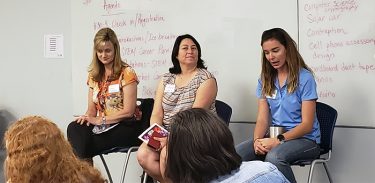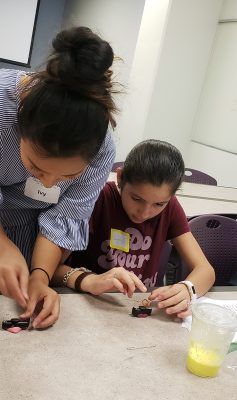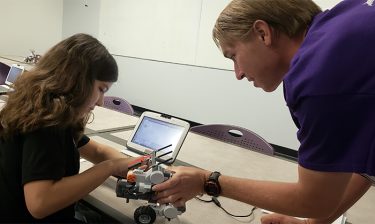
Story and photos by Lana Sweeten-Shults
GCU News Bureau
Forget stirring gooey cookie batter.
Instead, fourth- through eighth-grade girls at Saturday’s Girl Powered STEM Workshop in Grand Canyon University’s Engineering Building stirred up a little chemistry, churning out a few batches of wonderfully flubbery, slime-like gooey gak.
Then -- mind storm! -- they programmed LEGO cars.
Their minds also were blown hearing about missile launches, the unfettered engineering joy of blowing up stuff, and the next generation of tank munitions called AMPs, or Advanced Multi-Purpose tank rounds.
The girls at the workshop -- presented by the GCU Robotics Club and Strategic Educational Alliances and inspired by VEX Robotics’ Girl Powered initiative -- bathed in the battery light-powered glow of science, technology, engineering and math at various learning stations as they were encouraged to pursue STEM careers. Women make up just 24 percent of the STEM workforce, according to VEX.

Participants also soaked up the experiences of impressively confident women engineers, such as Ashley Lochetto.
Lochetto, a direct-fire test engineer for the Army at Yuma Proving Ground and one of three speakers at the event, knows how it feels to be the only woman engineer walking into a room of male engineers.
“I said, ‘Hey! I’m going to blow stuff up today!’” said the high-energy Lochetto when she walked into one of those situations. That seemed to break the ice.
Lochetto went against the grain of her medical field family to study mechanical engineering with a specialty in explosives engineering at the New Mexico Institute of Mining and Technology.
“Those Bradleys (Army tanks dubbed Bradley Fighting Vehicles), I shoot those,” she told the girls.
Michelle Ryan, who has been a senior test engineer with Intel for almost two decades, said, “When I started out at Intel, I was one woman out of a group of 50 men. … Now half of them are women.”
Unlike Lochetto, who said she wrote her college essay in second grade about how she wanted to become an engineer, Ryan aimed for teaching. Then her uncle, a civil engineer, told her about an engineering program for girls at the University of Arizona. With encouragement from her family, she decided to change her career path. “I didn’t even know what a breadboard was when I was in my engineering class,” she said.
Amy Peters, Senior Director of Mission Assurance Engineering for Northrop Grumman Innovation Systems, told the audience of math- and science-minded girls about her job -- launching rockets.
“I get to launch really big ones. We get to launch to the International Space Station. … We take supplies to them. We launch satellites into space. I get to verify that a rocket is ready to go.”
The coolest part of her job, she said, is the drama of sitting at the launch console before shooting off those big rockets.
“How many of you guys have seen movies, like NASA movies, where they’re sitting on console and they’re like, OK, the countdown. Well, that’s real. They really DO count down. And sometimes it goes really smooth and it’s ‘10, nine, eight,’ blah, blah, blah, blah, WHOOSH! And it goes up, right? And then there’s some times when it doesn’t, and you have a ‘Hold, hold, hold, hold,’ and you see those people in a room sweating it out, and they’re REALLY sweating it out.’”
She also told the girls about one of the coolest awards she received, a Champion of the Year Award in 2017 from the Missile Defense Advocacy Alliance, a nonprofit organization whose mission is to drive for the deployment, development and evolution of missile defense. The organization was founded in 2002 by Ricki Ellison, a former professional football player with the San Francisco 49ers and Oakland Raiders.
“I’m dressed for business,” Peters said, as anyone would be at an awards banquet. “I didn’t realize, but he (Ellison) tosses you a football. I thought, ‘Oh my gosh! I’m going to have to catch this!’ … They start calling people up, and you have to go for this pass. So I did, and I walked away with this football.”
The girls in the audience erupted into applause after Peters’ story and the image of her dramatic catch.
She also has received a challenge coin, given by generals who “think you’ve done something great,” Peters said.
Lochetto, a challenge coin recipient, too, said some of her biggest awards, ironically, have been her failures.
“I had a rocket that blew up. My cores were spinning out, like this,” she said, her arms motioning in horizontal circles. She explained how a TOW anti-tank missile operates with the help of a little eye called a ruby. As it turns out, the ruby was cracked.
“Even the little failures teach me something,” she said, then told the girls about a project she’s excited about: “My favorite test will be the next generation tank round, the AMP,” then spoke about smart rounds and how operators actually can speak to weaponry and tell it what to do.

Girls in the workshop learned even more at various activity stations following the talk -- just call it speed dating, except that the date is with science.
At the gooey gak station, participants stirred borax, water and glue and, voila! The flubbery, gooey gak slime mixture emerged.
Twenty minutes later, GCU Robotics Club president Makayla Jewell yawped, “Switch stations!”
One group of girls headed to the LEGO MindStorm station, where the goal was to program LEGO robots to zip from a taped starting line on a table to a taped-off finish area at the other end.
When one robot didn’t quite make it to the end, one of the Robotics Club volunteers asked, “What do you think we need to do to make it go farther?”
Out came the measuring tape, and it was back to the computer for more programming.
Another group headed to the Battery Motor station, where they made simple electric motors using a battery, wire, paper clips, modeling clay and a small magnet. The activity showed how electrical energy can be converted into mechanical energy via an electric motor like the battery motor, which works by way of the interaction between a current and magnetic field.
Participants also stopped by the goal-setting station, where they talked about the goals someone might have in robotics.
One girl piped up, “I want the robot to help around the house.”
They also discussed their dreams.
“I want to either be a programming person -- or a scientist,” said one Girl Powered participant. “I like animals and plants, but I also want to do physics.”
Sixth-grader Isabel Cardenas of Rogers Ranch Elementary School has her sights set on becoming a mechanical engineer: “I just really like working with coding and with building,” though she said the idea of working at NASA also piqued her interest.
Ed Koeneman, GCU electrical engineering technology professor and the Robotics Club faculty adviser, said the Girl Powered workshop came about after the club heard about the opportunity to get sponsorship from VEX. That’s when he got together with Cori Araza, Director of STEM Outreach and Program Development, to partner and organize the event.
VEX Robotics’ Girl Powered initiative aims to redefine the face of STEM and show how everyone is welcome in the robotics community.

According to VEX, “Walking around any competitive robotics event, or into the office of countless high-tech companies, it’s not hard to see that the majority of the participants or employees are men. Girls make up only 23 percent of VEX participants, and women represent 24 percent of the STEM workforce.
“It’s easy to shrug it off as ‘girls don’t like that stuff,’ but that’s simply not true. Studies have shown that girls and boys show equal interest in science and math in elementary school, and show that girls lose this interest in middle school for a variety of reasons.”
Ryan said it’s important to have more women in the field because women just make teams work differently.
“Women bring a whole new dynamic,” she said. “We grow up differently. We have different views. You build a different product that way,” she said.
Lochetto said it’s important, too, in “having the confidence, as a girl, to say, ‘Hey, you guys are wrong.’”
Ryan knows firsthand how intimidating being in engineering can be -- she spoke of the leadership roles she has taken on with Intel. But, like Lochetto, she said to be confident and contribute to the conversation: “Don’t be intimidated in what you have. Engineering is problem-solving. … Maybe your idea that you brought into the team didn’t work. But just understanding that you’re just all trying to solve a problem and you bring your best self into the team.”
GCU computer science junior Astrid Guaran is just one of a number of young women who are members of the University’s Robotics Club.
She said the Girl Powered workshop help set the stage for the next generation of robotics engineers, mechanical engineers, computer programmers and the like.
“I just liked having the opportunity to talk to them and let them know that it’s OK to have different interests -- to be confident and see that there’s opportunities.”
Contact Lana Sweeten-Shults at [email protected] or at 602-639-7901.
****
Related content:
GCU Today: Guinness World Record honor thrills Robotics Club
GCU Today: Thunderbots nail the nuts and bolts in 1st world finals
GCU Today: DNA gets A-OK from STEM campers
GCU Today: STEM event stirs up science and ice cream



































































